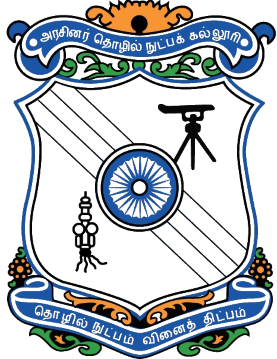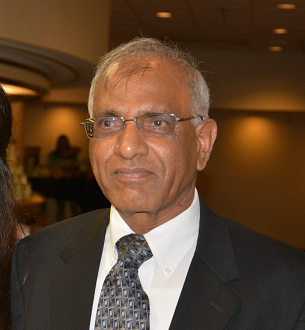Related Research Articles

The Indian Institute of Science (IISc) is a public, deemed, research university for higher education and research in science, engineering, design, and management. It is located in the southern Indian city of Bangalore, Karnataka. The institute was established in 1909 with active support from Jamsetji Tata and thus is also locally known as the Tata Institute. It was granted a deemed university status in 1958 and recognized as an Institute of Eminence in 2018.
Chandrasekhar, Chandrashekhar or Chandra Shekhar is an Indian name and may refer to a number of individuals. The name comes from the name of an incarnation of the Hindu god Shiva. In this form he married the goddess Parvati. Etymologically, the name comes from the Sanskrit words "चन्द्र (chandra)", meaning "moon", and "शेखर (śekhara)", meaning "crest" or "crown", which is an epithet of the Shiva.

Government College of Technology, Coimbatore (GCT) is an autonomous state-funded engineering college located in Coimbatore, Tamil Nadu, India. It is affiliated to Anna University.

Anurag Kumar was the Director of the Indian Institute of Science at Bangalore, India from 2014–2020. He is a professor at the Department of Electrical Communication Engineering, and has served as the Chairperson of the Electrical Sciences Division at the Indian Institute of Science, before being appointed as the Director in 2014.
Swami Manohar, otherwise known as Manohar Swaminathan, is a co-founder and the CEO of PicoPeta Simputers Pvt. Ltd. He completed his undergraduate program in Electronics and Communication Engineering in Government College of Technology, Coimbatore during which he was a part of a campus team that designed an Electronic Voting machine in the year 1981, which was actually the first designed in India. After obtaining his PhD in Computer Science from Brown University he was a faculty at the University of North Carolina for two years and then was at the Indian Institute of Science (IISc), Bangalore, between 1990 and 2005. He was on the faculty of the department of Computer Science and Automation (CSA) and the Supercomputer Education and Research Center (SERC) at the Institute. He has been a visiting faculty at Columbia University, University of Missouri and the University of Texas. While at IISc, he co-invented the Simputer, was awarded the Dewang Mehta Award for Innovation in IT, and pioneered the faculty entrepreneurship activity at IISc, which has since catalyzed similar activity in IITs and other educational institutes in India. He co-founded Strand Life Sciences, and String Labs, the first academic incubating company in India.
David Gilbert Luenberger is a mathematical scientist known for his research and his textbooks, which center on mathematical optimization. He is a professor in the department of Management Science and Engineering at Stanford University.

Junuthula N. Reddy is a Distinguished Professor, Regent's Professor, and inaugural holder of the Oscar S. Wyatt Endowed Chair in Mechanical Engineering at Texas A&M University, College Station, Texas, USA.[1] He is an authoritative figure in the broad area of mechanics and one of the researchers responsible for the development of the Finite Element Method (FEM). He has made significant seminal contributions in the areas of finite element method, plate theory, solid mechanics, variational methods, mechanics of composites, functionally graded materials, fracture mechanics, plasticity, biomechanics, classical and non-Newtonian fluid mechanics, and applied functional analysis. Reddy has over 620 journal papers and 20 books and has given numerous national and international talks. He served as a member of the International Advisory Committee at ICTACEM, in 2001 and keynote addressing in 2014.[2][3]

Ravindra K. Ahuja is an Indian-born American computer scientist and entrepreneur. He is currently Professor of Industrial and Systems Engineering at the University of Florida in Gainesville, Florida, and CEO of the automation and optimization solutions provider Optym, which he founded in 2000 as Innovative Scheduling, Inc.

Manchanahalli Rangaswamy Satyanarayana Rao was an Indian scientist. He was awarded the fourth-highest civilian award, the Padma Shri, for Science and Engineering in 2010. From 2003 to 2013 he was president of Jawaharlal Nehru Centre for Advanced Scientific Research (JNCASR) in Bangalore, India.

Narayanaswamy Balakrishnan is an Indian aerospace and computer scientist. He is a Professor of the Department of Aerospace Engineering and Supercomputer Education Research Centre of Indian Institute of Science and a visiting professor of Jawaharlal Nehru Centre for Advanced Scientific Research. Balakrishnan was honored by the Government of India, in 2002, with the fourth highest Indian civilian award of Padma Shri

Vaidyeswaran Rajaraman is an Indian engineer, academic and writer, known for his pioneering efforts in the field of Computer Science Education in India. He is credited with the establishment of the first academic program in computer science in India, which he helped initiate at the Indian Institute of Technology, Kanpur in 1965. An elected fellow of all the Indian science academies, he is a recipient of Shanti Swarup Bhatnagar Prize, the highest Indian award in Science and Technology category for young scientists and several other honors including Om Prakash Bhasin Award and Homi Bhabha Prize. The Government of India awarded him the third highest civilian honor of the Padma Bhushan, in 1998, for his contributions to science.
V. Nagaraja is a Professor, Department of Microbiology and Cell Biology, Indian Institute of Science, Bengaluru. He had received his B.Sc. and M.Sc. degrees in the year 1973 and 1975 from the Bangalore University. He completed his Ph.D. in 1981 from Department of Microbiology and Cell Biology at IISc and the work on mycobacteriophage I3 and role of DNA gyrase in mycobacteria set the stage for his later work when he joined the Institute as an assistant professor in 1989. After his PhD in 1981, he was a research associate at Biozentrum, University of Basel, Switzerland (1981–85) and at Department of Biology, University of Rochester, USA(1985–89). He joined in 1989 as an assistant professor, in Centre for Genetic Engineering, IISc and was involved in setting up of the department. He became an associate professor in 1995 at Department of Microbiology and Cell Biology, IISc, Professor in 2000 and served as professor and chairman of the department (2008–2013). He has been appointed president of Jawaharlal Nehru Centre for Advanced Scientific Research (JNCASR) by the Cabinet Committee on Appointments with effect from 14 October 2015.
Kalappa Muniyappa is an Indian molecular biologist and geneticist, known for his researches on the chromatization of DNA and gene targeting. He is a professor and chairman of the department of biochemistry of the Indian Institute of Science and an elected fellow of the Indian National Science Academy, Indian Academy of Sciences and the National Academy of Sciences, India. The Council of Scientific and Industrial Research, the apex agency of the Government of India for scientific research, awarded him the Shanti Swarup Bhatnagar Prize for Science and Technology, one of the highest Indian science awards, in 1995, for his contributions to biological sciences.
Srinivasan Chandrasekaran is an Indian organic and organometallic chemist, academic and a former chair of the Department of Organic Chemistry and the Division of Chemical Sciences. He was also a former Dean of the Faculty of Science at the Indian Institute of Science. He was known for his research on organic reaction mechanisms and organic synthesis. and was an elected fellow of the Indian National Science Academy, The World Academy of Sciences and the Indian Academy of Sciences. The Council of Scientific and Industrial Research, the apex agency of the Government of India for scientific research, awarded him the Shanti Swarup Bhatnagar Prize for Science and Technology, one of the highest Indian science awards, in 1989, for his contributions to chemical sciences.
Suryanarayanasastry Ramasesha is an Indian quantum chemist and a former Dean of the Faculty of Science at the Indian Institute of Science. He is a former chair of the Solid State and Structural Chemistry Unit and Amrut Modi Chair professor of Chemical Sciences at IISc. He is known for his studies on conjugated organic systems and low-dimensional solids and is an elected fellow of the Indian National Science Academy, the Indian Academy of Sciences and The World Academy of Sciences. The Council of Scientific and Industrial Research, the apex agency of the Government of India for scientific research, awarded him the Shanti Swarup Bhatnagar Prize for Science and Technology, one of the highest Indian science awards, in 1992, for his contributions to chemical sciences.

Subramaniam Ramakrishnan is an Indian polymer chemist, a professor at the Department of Inorganic and Physical Chemistry http://ipc.iisc.ac.in/~rk/ and the designer at th3 Macromolecular Design and Synthesis Group of the Indian Institute of Science. He is known for his studies on design and synthesis of controlled polymer structures and is an elected fellow of the Indian Academy of Sciences. The Council of Scientific and Industrial Research, the apex agency of the Government of India for scientific research, awarded him the Shanti Swarup Bhatnagar Prize for Science and Technology, one of the highest Indian science awards, in 2005, for his contributions to chemical sciences.
Manohar Lal Munjal is an Indian acoustical engineer, honorary professor, and INSA senior scientist at the Facility for Research in Technical Acoustics (FRITA) of the Indian Institute of Science. He is known for his studies on aeroacoustics and finite wave analysis of exhaust systems. He is an elected fellow of all the three major Indian science academies viz. Indian Academy of Sciences, Indian National Science Academy, National Academy of Sciences, India as well as the Indian National Academy of Engineering. He has published three books viz. Noise and Vibration Control, Acoustics of Ducts and Mufflers With Application to Exhaust and Ventilation System Design, and IUTAM Symposium on Designing for Quietness and has contributed chapters to books edited by himself and others. The Council of Scientific and Industrial Research, the apex agency of the Government of India for scientific research, awarded him the Shanti Swarup Bhatnagar Prize for Science and Technology, one of the highest Indian science awards for his contributions to Engineering Sciences in 1986.
Erode Subramanian Raja Gopal was an Indian condensed matter physicist, a former professor at the Indian Institute of Science and a former director of the National Physical Laboratory of India. Known for his research in condensed matter physics, Raja Gopal was an elected fellow of all the three major Indian science academies – the Indian National Science Academy, the National Academy of Sciences, India, and the Indian Academy of Sciences – as well as a member of the Institute of Physics. He was a former CSIR emeritus scientist, an alumnus of the University of Oxford and the author of three reference texts in condensed matter physics. The Council of Scientific and Industrial Research, the apex agency of the Government of India for scientific research, awarded him the Shanti Swarup Bhatnagar Prize for Science and Technology, one of the highest Indian science awards, for his contributions to Physical Sciences in 1978.
Ashok M. Raichur is an Indian materials scientist, nanotechnologist and a professor at the Department of Materials Engineering of the Indian Institute of Science, Bangalore. Known for his studies on the use of nanotechnology for biomedical and environmental applications, Raichur is a former Alexander von Humboldt Fellow and a life member of the National Academy of Sciences, India. The Department of Biotechnology of the Government of India awarded him the National Bioscience Award for Career Development, one of the highest Indian science awards, for his contributions to biosciences, in 2009.
References
- ↑ "Speakers - TEDx BITSGoa".
- ↑ Vijay Chandru; John Hooker (26 September 2011). Optimization Methods for Logical Inference. John Wiley & Sons. ISBN 978-1-118-03141-4.
- ↑ "IISc Centenary Conference". www.iisc.ernet.in. Archived from the original on 7 June 2011.
- ↑ "BioSpectrumIndia - the business of biotech - Biotech Guru". Archived from the original on 29 March 2009. Retrieved 9 December 2009.